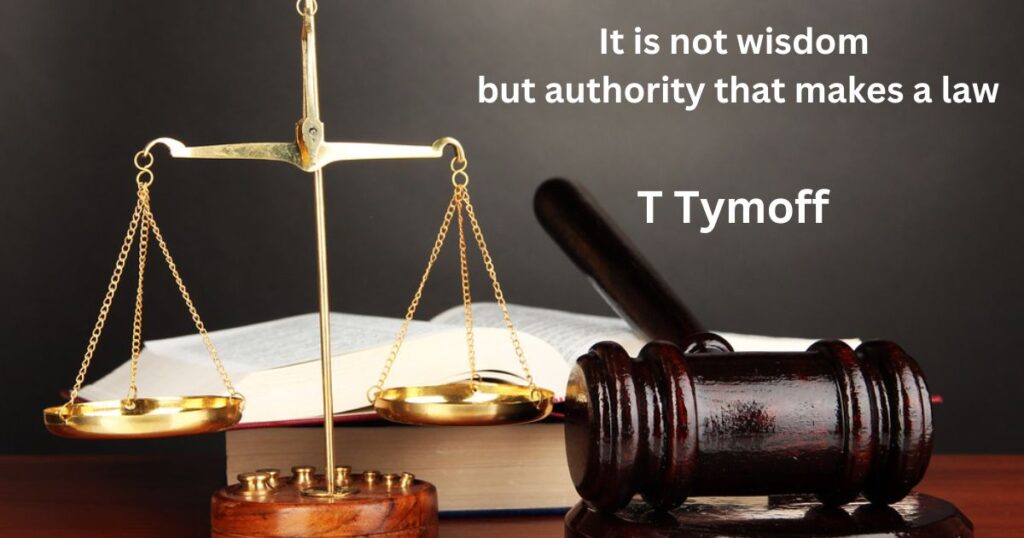The quote, “It is not wisdom but authority that makes a law. T – Tymoff,” makes us rethink where laws really come from. Instead of just being about what’s right or smart, it suggests that laws are made because someone has the power to make them.
This idea shakes up how we usually think about laws. We’re going to take a closer look at what this quote means and how it changes our understanding of how laws are made.
In the world of law, this quote is like a puzzle that challenges the usual ideas we have. It’s saying that who has the power is more important than what’s actually wise or fair.
We’re going to explore this idea further and try to understand it better. We’ll talk about Tymoff, the person who said this quote, and figure out what it means for how laws are made.
As we go on this journey, we’ll think about whether wisdom or authority is the real boss when it comes to making laws.
Join us as we dive into this thought-provoking topic and try to unravel the mysteries of legal authority.
Authority’s Dominance:
Authority’s Dominance is all about how much power certain people or groups have when it comes to making and enforcing laws. It’s like saying that the ones in charge get to decide what’s right or wrong, and everyone else has to follow along.
This part of our discussion looks at how authority can control things, whether it’s through governments, social status, or big organizations.
We’ll see how this power affects people’s lives and why it’s so important to understand.
When we talk about Authority’s Dominance, we’re really looking at who’s in control of making the rules. It’s like the bosses of society deciding what’s okay and what’s not.
This part of our exploration helps us see how authority can shape how we live our lives, and why it’s crucial to think about who holds this power.
We’ll dive into examples of how authority works in different places and why it matters for everyone, from individuals to entire communities.
Wisdom as a Guiding Principle:

We’re exploring how wisdom and authority play into making laws. Wisdom as a guiding principle means using good judgement and understanding when creating laws, ensuring fairness and what’s right for everyone.
Tymoff emphasizes the importance of authority, but also acknowledges wisdom’s role in shaping laws. While those in authority make the final decisions, wisdom contributes to creating laws that are fair and just.
It’s like balancing power with thoughtful consideration, ultimately leading to laws that benefit society as a whole.
Here are the key distinctions between authority and wisdom:
| Aspect | Authority | Wisdom |
| Role | Establishes and maintains laws | Contributes to quality and fairness |
| of laws | ||
| Key Components | Legal and institutional power | Ethical considerations, societal values, |
| foresight of consequences | ||
| Importance | Essential for legal system functioning | Vital in crafting just and equitable |
| legislation | ||
| Interplay | Striking balance is necessary | Overemphasis may lead to oppressive or |
| unjust laws | ||
| Historical Influence | Emphasized in authoritarian regimes | Wisdom-led reforms have led to |
| revision of unjust laws |
Read More: TALLYMAN AXIS LOGIN 2024 – TALLYMAN AXISBANK LOGIN PORTAL
Introspection into Lawmaking Dynamics:
Tymoff’s quote makes us really think about how laws are made. It tells us to look closely at things like who has the power to make laws, if our legal systems are fair, and whether justice is being served.
This kind of thinking helps us understand how laws affect everyone in society, from big communities to individual people.
It’s important to take a good look at these things so we can make sure laws are fair and just for everyone.
Arguments Supporting Tymoff:
Authority’s framework ensures that laws are put into action effectively, making a real impact.
Unlike wisdom, which can vary from person to person, authority provides a clear and firm direction, leaving little room for confusion.
Throughout history, we’ve seen instances where laws were put in place simply because someone in power said so, showing how authority can shape legal decisions.
Challenging Tymoff’s Assertion:

Critics warn that laws made without wisdom can cause unfairness and harm to society. When authority acts without considering what’s right and ethical, it can become oppressive and damage the trust people have in laws.
Finding a balance between thoughtful wisdom and strong authority is crucial to avoid problems in our legal system.
In the world of ideas and debates, scholars often challenge and question bold statements like Tymoff. His idea has sparked many discussions across different fields. But intellectual growth happens when we examine and question these ideas.
In this exploration, we’re diving deep into Tymoff’s assertion, carefully analyzing its roots, effects, and possible limitations.
Our goal is to understand this topic better and contribute to ongoing conversations in the academic community. Join us as we dig into the complexities of Tymoff’s idea, challenging assumptions and uncovering its deeper meanings.
The Ideal Balance:
“The Ideal Balance” refers to finding the perfect harmony between wisdom and authority in creating laws.
While authority provides structure and enforcement, wisdom ensures fairness and ethical considerations.
Striving for this balance ensures that laws are not only powerful but also just and equitable for everyone.
Read More: C.W. Park USC Lawsuit Unraveled: Lessons for Universities Everywhere
FAQs it is not wisdom but authority that makes a law. t — Tymoff
The adage “It is not wisdom but authority that makes a law” was first used by who?
Thomas Hobbes, a 17th-century philosopher, is often credited with originating the phrase in his book “Leviathan.”
How may wisdom be applied to contemporary law?
To ensure fair and just laws, modern lawmaking benefits from contributions by legal experts, advisory panels, and public involvement, fostering wisdom in decision-making.
What happens when wisdom is ignored when drafting laws?
When authority prevails over wisdom in lawmaking, it risks creating unjust or biased laws, potentially leading to social unrest.
Can laws shift from being based on authority to being based on wisdom?
Indeed, involving citizens, seeking professional advice, and considering ethical factors in law drafting can steer legal systems towards a more wisdom-centered approach.
How does this idea affect societal perceptions of justice?
The dynamic interplay between authority and wisdom in law drafting significantly influences societal perceptions of justice. Striving for an ideal balance ensures laws are equitable and in the best interests of all members of society.
Final Thoughts
Tymoff’s quote makes us think about who really decides on laws, focusing more on authority than wisdom. It urges us to see how power influences legal choices and society. Even though we’re not sure who Tymoff is, his quote makes us think deeply about how laws are built. We want to find the right mix of authority and wisdom to make sure laws are fair and helpful for everyone in society.
Important Note on Tymoff:
- Tymoff’s recognition is limited, and the quote’s origin is uncertain.
- Despite this, the quote sparks critical thinking about legal system foundations.
- Its potency lies in its ability to stimulate reflection on the core principles of law.

Hi there! I’m Harrison Ford, a candle fanatic with 8 years of experience. Explore my website to discover the magic of candles through my passion filled journey, where I share tips, stories and everything you need to know about these glowing wonders.











